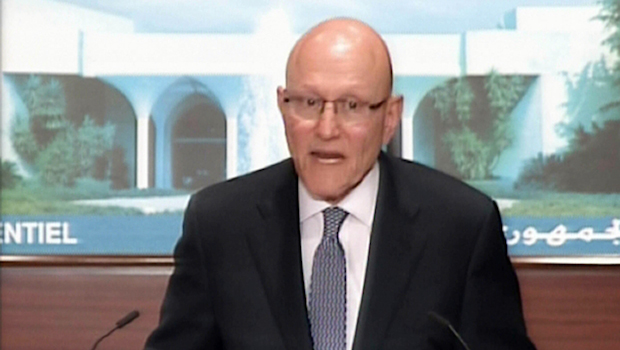
An image grab from Télé Liban shows Lebanese Prime Minister Tammam Salam addressing the media to announce the formation of a new Lebanese government on February 15, 2014. (AFP PHOTO/TÉLÉ LIBAN)
London, Asharq Al-Awsat—Lebanese Prime Minister Tammam Salam announced his national unity Cabinet Saturday, bringing an end to a 10-month political stalemate that shut down normal government operations in the country.
The previous government of former Prime Minister Najib Mikati resigned in March 2013, largely due to political turmoil linked to the war in neighboring Syra.
Last month, former Prime Minister Saad Hariri’s announcement that his powerful March 14 alliance would agree to share power with Hezbollah in a national unity government paved the way for the formation of a new cabinet.
March 14 had originally refused to form a government in which powerful Shi’ite political party and militia Hezbollah was a member until it withdrew its fighters from Syria.
This is a unity Cabinet that represents at the present time the best formula for Lebanon with all the political, security, economic and social challenges it is facing,” Salam told reporters Saturday, referring to the increasingly spillovers of violence from its larger neighbor.
This Cabinet is expected to remain in government until the end of Preisdent Michel Suleiman’s six-year term in May, when elections will be held and a new Cabinet formed.
Lebanon’s new Cabinet is composed of 24 ministers:
• Tammam Salam: Prime Minister
• Samir Moqbel: Deputy Prime Minister, Minister of Defense
• Nouhad Mashnouq: Minister of the Interior
• Gibran Bassil: Minister of Foreign Affairs
• Ali Hassan Khalil: Minister of Finance
• Remon Areiji: Minister of Culture
• Rashid Derbas: Minister of Social Affairs
• Wael Abu Faour: Minister of Health
• Mohamed Fneish: Minister of State
• Nabil De Freij: Minister of State
• Alain Hakim: Minister of the Economy
• Boutros Harb: Minister for Telecommunications
• Hussein Haj Hassan: Minister of Industry
• Abdul Muttaleh Al-Hinawi: Minister of Youth and Sport
• Ramzi Joreig: Minister of Information
• Mohamed Mashnouq: Minister of the Environment
• Arthur Nazarian: Minister of Energy
• Michel Pharoun: Minister of Tourism
• Sejaan Qazi: Minister of Labor
• Ashraf Rifi: Minister of Justice
• Elias Abu Saad: Minister of Education
• Alice Shabtini: Minister for Displaced
• Akram Shehayeb: Minister of Agriculture
• Ghazi Zeaiter: Minister for Public Works and Transportation
